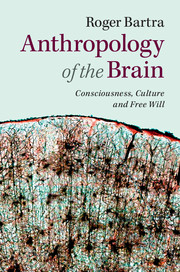Book contents
- Frontmatter
- Contents
- Preface
- Part I Consciousness and symbolic systems
- 1 The hypothesis
- 2 Evolution of the brain
- 3 Brain plasticity
- 4 Is there an internal language?
- 5 Amputations and supputations
- 6 The atrophied exocerebrum
- 7 The symbolic substitution system
- 8 Neuronal mirrors
- 9 Consciousness within hand’s reach
- 10 Outside and inside: the immense blue
- 11 The musical spheres of consciousness
- 12 Artificial memory
- 13 The lost soul
- Part II Brain and free will
- Bibliography
- Index
3 - Brain plasticity
Published online by Cambridge University Press: 05 June 2014
- Frontmatter
- Contents
- Preface
- Part I Consciousness and symbolic systems
- 1 The hypothesis
- 2 Evolution of the brain
- 3 Brain plasticity
- 4 Is there an internal language?
- 5 Amputations and supputations
- 6 The atrophied exocerebrum
- 7 The symbolic substitution system
- 8 Neuronal mirrors
- 9 Consciousness within hand’s reach
- 10 Outside and inside: the immense blue
- 11 The musical spheres of consciousness
- 12 Artificial memory
- 13 The lost soul
- Part II Brain and free will
- Bibliography
- Index
Summary
Before beginning to look for incomplete neuronal circuits that require external prostheses in order to function, it is necessary to tackle a broader problem: the form in which cerebral networks are configured to adapt to experiences the individual confronts when interacting with the environment throughout his or her life. Researchers have demonstrated the existence of neuronal plasticity processes in circuits that require experiences coming from the external environment in order to be normally completed in the brains of mammals and other animals. But not all plasticity depends on external factors. It is not simply reduced to the way in which certain cerebral circuits are shaped by the environment. Donald Hebb’s classic study published in 1949 shows that neuronal activity itself can strengthen certain synaptic connections when there is simultaneous activity in the presynaptic terminal and in the postsynaptic element of the neuron. A much-cited example of plasticity in Hebbian synapses are the ganglion cells in the mammalian retina that organize layers of the lateral geniculate body in the thalamus of the brain by firing sequences of impulses through the eye. Activity after-effects appear to be randomly produced in both rhythm and direction in such a way that the possibility of cells far away from each other firing simultaneously is remote, and so the connection holding them together becomes weak or disappears. This type of after-effect can still be observed in retinas that are separated from the eye and maintained alive in liquid solutions, which illustrates the independence of these plasticity processes with regard to external stimuli. This type of plasticity enables the genomic flow of information to be reduced, thus explaining how it is possible that the emergence of each neuron and each connection throughout an individual’s growth and development would not need to be previously encoded in the genome.
- Type
- Chapter
- Information
- Anthropology of the BrainConsciousness, Culture, and Free Will, pp. 14 - 20Publisher: Cambridge University PressPrint publication year: 2014



